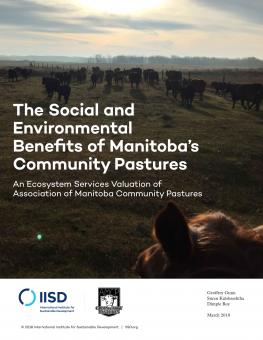
The Social and Environmental Benefits of Manitoba's Community Pastures
A total economic value analysis of Manitoba's community pastures, demonstrating the private and public benefits of sustainable grazing management.
This study summarizes the benefits and related economic values of community pastures managed by the Association of Manitoba Community Pastures in Manitoba, Canada.
Based on data and information directly from the community pastures and information available through a search of relevant literature, the total economic value (TEV) of Manitoba community pastures (MCPs) was calculated. Benefits that were not included in the TEV were highlighted as gaps that could be the focus of further research.
Based on available data and information, this research determined that the ecological goods and services from MCPs are valued at CAD 13,349,646 per year (based on a price of CAD 25 per tonne for carbon dioxide). The largest components of this value are forage production and carbon sequestration, but soil formation, biodiversity, recreation and hunting, community development, and timber are also included. Some components—including species at risk, pollination and long-term carbon storage—were excluded due to insufficient data or significant variation across pasture landscapes. This value therefore represents an incomplete estimate of ecological goods and services from the MCPs studied but does incorporate major service contributions.
Based on this research, the author's recommendations include the maintenance of MCPs and the concentrated benefits that they provide producers and society. These large tracts of natural or naturalized land protect habitat, store carbon, and improve water retention and water quality. There are gaps in existing research, data and information that inhibit more precise valuation of community pastures and grasslands in Western Canada. Current grazing management encourages sustainable delivery of commercial and non-commercial value to the landscape. At the same time, enhanced monitoring systems to qualify and quantify the benefits of ecosystem goods and services from pastures should be developed to measure and assess specific public benefits provided by community pastures. Quantification of total value of benefits informs policy and can help sustain community pastures in the future.
Further examination of the relationships between management systems, their impacts and values would also improve our overall understanding of these valuable, but quickly disappearing, landscapes and provide more guidance for adaptive management.
Participating experts
You might also be interested in
The Responsible Agricultural Investment Tool for Agribusiness and Case Studies
This report summarizes a collaboration to support agribusinesses in complying with principles of responsible investment in agriculture and food systems.
Promoting the Development of Agricultural Cooperatives
Governments in the Global South should promote agricultural cooperatives to boost smallholder access to fair markets, finance, and climate resilience.
Adding Fuel to the Fire: How export restrictions can exacerbate climate change’s impacts on global food security
Higher temperatures will likely reduce agricultural yields and production in most countries, raising global food prices and worsening food security. Avoiding export restrictions is crucial.
Addressing Soil Acidity and Enhancing Soil Health
This policy report addresses the critical issue of soil acidity in the East African Community (EAC) and provides actionable recommendations for EAC partner states, the EAC Secretariat, and other relevant stakeholders.